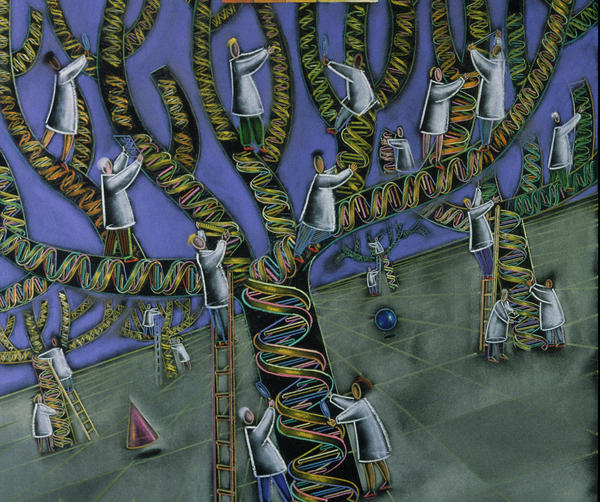
Would it be ethical for scientists to try to create babies that have genetic material from three different people? An influential panel of experts has concluded the answer could be yes.
The 12-member panel, assembled by the National Academies of Sciences, Engineering and Medicine, released a 164-page report Wednesday outlining a plan for how scientists could ethically pursue the controversial research.
"The committee concludes that it is ethically permissible" to conduct such experiments, the report says, but then goes on to detail a long list of conditions that would have to be met first.
For example, scientists would have to perform extensive preliminary research in the laboratory and with animals to try to make sure it is safe. And then researchers should initially try to make only male babies, because they would be incapable of passing their unusual amalgamation of DNA on to future generations.
"Minimizing risk to future children should be of highest priority," the committee writes.
The report was requested by the Food and Drug Administration in response to applications by two groups of scientists in New York and Oregon to conduct the experiments. Their goal is to help women have healthy babies even though they come from families plagued by genetic disorders.
A statement issued by the FDA immediately after the report's release raised questions about whether the FDA would permit the research to move forward.
The FDA email praised the "thoughtful work" of the panel and said the agency would be "reviewing" the recommendations. But it noted that the latest federal budget "prevents the FDA from using funds to review applications in which a human embryo is intentionally created or modified to include" changes that could be passed down to future generations. As a result, the email says, any such research "cannot be performed in the United States" at this time.
The researchers pursuing these experiments welcomed the panel's conclusions.
"I think it's a great step in the right direction," Mark Sauer, a professor of obstetrics and gynecology at Columbia University who is a member of one of the teams, said of the National Academies report in an interview before the FDA issued its statement.
Sauer called the report more of a "yellow light" than a "green light," because of the long list of caveats and cautions. But that is "better than a red light," he says.
"Most importantly to us is that it allows the work to continue to hopefully produce children without these disorders," Sauer says.
But Sauer said he was disappointed when he learned of the FDA's response.
"Politics as usual often gets in way of progress," Sauer said in a subsequent email. While the FDA statement would cause "undue delays" in his research, he added that he hoped it wouldn't permanently "necessarily halt the efforts."
Critics of the research, meanwhile, say the number of women who could benefit from the experiments is so small that it's not worth crossing a line that's long been considered off-limits — making genetic changes that could be passed down for generations.
"The possibility of what you could call 'mission creep' is very real," says Marcy Darnovsky, executive director of the Center for Genetics and Society, a watchdog group based in Berkeley, Calif. "People are talking about going forward not just with this but with the kind of genetic engineering that will produce outright genetically modified human beings."
Babies With Genes From 3 People Could Be Ethical, Panel Says
By ROB STEIN • FEB 3, 2016
No comments:
Post a Comment